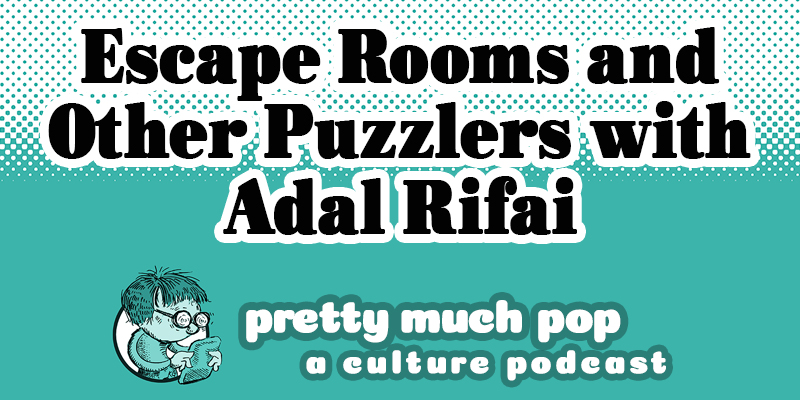The Allure of Puzzlement: Pretty Much Pop #34 w/ Adal Rifai on Escape Rooms and Other Puzzling Pastimes

The comic and the tragic are well-established modes within entertainment, but what about the puzzling? Riddles may have been a chief pastime in days of yore (well, they're featured in Oedipus and The Hobbit, anyway), but does this way of being entertained have a place in today's age of mass media?
Improviser and podcaster Adal Rifai joins Mark Linsenmayer, Erica Spyres, and Brian Hirt to discuss his love of escape rooms, riddles, and other opportunities for puzzlement. We discuss lateral vs. algorithmic thinking, group dynamics, comparisons to improvisation and trivia, riddle types, video games, and more. Some puzzle-relevant films we touch on include Escape Room, Cube, The Game, and Midnight Madness.
Some resources we used to prepare include:
- Adal's podcast Hey, Riddle Riddle
- "Get Me Out of Here! Why Escape Rooms Have Become a Global Craze" by Simon Usbourne
- "Five-Year US Escape Room Industry Report" by Lisa Spira
- "Five Dead, One Injured in Polish Escape Room Fire" by David Spira
- "Solving Puzzles Satisfies The Nimble Brain" from NPR
- Wikipedia on Escape Rooms and Escape-the-Room Video Games
- TV Tropes on Stock Video Game Puzzles
Adal's two other podcasts are Hello From the Magic Tavern and Siblings Pecular. Follow him @adalrifai. He performs regularly on Whirled News Tonight at Chicago's IO Theater.
Every Pretty Much Pop episode includes bonus, post-episode discussion, and this time Adal stayed around for a little more on escape rooms (can they engage all five senses?) and quite a bit more on podcasting, including the parasocial relationships that listeners may have with podcast hosts. This was sufficiently fun that we'd like to share it with all of you, in hopes that you might then want to hear this for all our our episodes by supporting us at patreon.com/prettymuchpop.
This podcast is part of the Partially Examined Life podcast network.
Pretty Much Pop: A Culture Podcast (prettymuchpop.com) is curated by Open Culture. Browse all Pretty Much Pop posts or start with the first episode.
The Allure of Puzzlement: Pretty Much Pop #34 w/ Adal Rifai on Escape Rooms and Other Puzzling Pastimes is a post from: Open Culture. Follow us on Facebook, Twitter, and Google Plus, or get our Daily Email. And don't miss our big collections of Free Online Courses, Free Online Movies, Free eBooks, Free Audio Books, Free Foreign Language Lessons, and MOOCs.
from Open Culture https://ift.tt/2vVV8WI
via Ilumina
Comments
Post a Comment